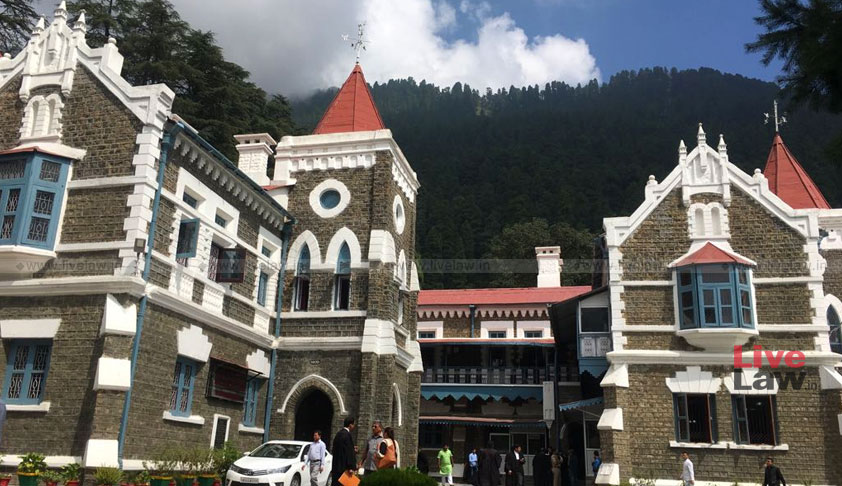A judgment passed by the Uttarakhand High Court in the year 2018 which was appealed to be modified will now be heard by a third Single judge due to conflicting verdicts given by the Division bench.
The bench comprising Hon’ble Chief Justice Ramesh Ranganathan and Hon’ble Justice Lok Pal Singh were hearing a plea regarding setting up permissible noise limit for loudspeakers. The modification application was filed under sections 151 and 152 CPC read with Article 226 of the Constitution of India.
The applicant, who claimed to be a representative of all mutawallies of Waqfs of all mosques in the entire State of Uttarakhand, sought a direction by the court to permit use of loudspeakers in places of worships within the limits prescribed in the schedule to the Noise Pollution (Regulations and Control) Rules, 2000.It is pertinent to mention here that he was not a party to the original petition where the order to be modified was passed.
The applicant was mainly aggrieved by a direction issued by the Division Bench in Writ Petition (PIL) No.112 of 2015 dated 19.06.2018, which reads as under:-
“The State Government is directed to ensure that no loudspeaker or public address system shall be used by any person including religious bodies in Temples, Mosques and Gurudwaras without written permission of the authority even during day time, that too, by getting an undertaking that the noise level shall not exceed more than 5dB(A) peripheral noise level”.
The petitioner, on the other hand, argued that the direction issued by the Division Bench in the above writ petition is for environmental sustainability and use of loudspeakers would tantamount to pollution according to the 2000 Rules. Further, the authorities denying the right to free use of loudspeakers were bound by the judgment passed by the Court which provided that a level of 75 dB(A) is for an industrial area and not for a residential area where all mosques are situated.
Chief Justice Ranganathan in his judgment referred to the judgment passed in Puthan Veettil Sankaran Nair v. Poomulli Manakkal Moopil Sthanam[1] wherein it was held that the the question of locus standi of the applicant cannot take away the inherent power of the Court to allow any amendment in itsjudgment, if it is fit to be allowed in view of the provisions of Sections 151 and 152 of the Code.
Reference was made to Rule 5 of the Noise Pollution (Regulation and Control) Rules,2000, which says that-
“The noise level at the boundary of the public place,where loudspeaker or public address system or any other noise source is being used shall not exceed 10 dB (A) above the ambient noise standards for the area or 75 dB (A) whichever is lower; the peripheral noise level of a privately owned sound system or a sound producing instrument shall not, at the boundary of the private place, exceed by more than 5 dB (A) the ambient noise standards specified for the area in which it is used”.
Ultimately, he concluded that the words- “the noise level should not exceed more than 5 dB(A) peripheral noise level” was an accidental, unintended error which has to be rectified and the words highlighted above should be mentioned additionally.
On the other hand, Justice Lok Pal Singh in his judgment dismissed the modification application on the ground that since the applicant did not have a locus standi, his modification application is not maintainable.
Besides, he also drew attention to the fact that the judgment which is requested to be modified was delivered was delivered by the Division Bench comprising of Justice Ranganathan, Hon’ble Justice Rajiv Sharma, and the ACJ wherein Hon’ble Cj had opined that the applicant may file a modification application after which this bench was constituted by the Chief Justice to hear the matter. In such a case, his being a part of the present Bench would tantamount to the violation of nemo iudex in causa sua, i.e. no person shall be a judge in his own cause-
“Though Hon’ble the Chief Justice has no direct or indirect connection in the matter but the fact remains that he has expressed his view at the time of hearing WP(PIL) no. 63 of 2020.”
He also expressed his resentment towards the defiant attitude adopted by the counsel for the applicant, Mr. T.A. Khan who made the following statement-
“If a member of the Division Bench (Justice Lok Pal Singh) is not inclined to grant any relief to the applicant, the modification application should be dismissed.”
He considered that the above statement of applicant’s counsel amounted to abandonment of the claim and it would be considered as withdrawal of claim, according to Order 23 Rule 1 CPC.
A copy of the order passed by Justice Ranganathan can be accessed here. click
A copy of the order passed by Justice Singh can be accessed here. click
[1] AIR 1970 Ker 57

